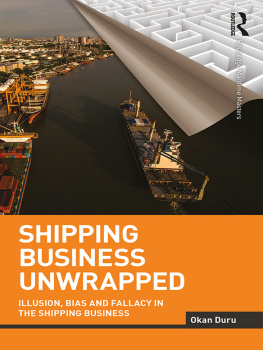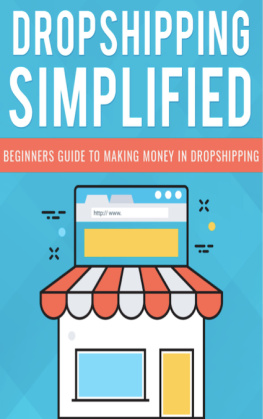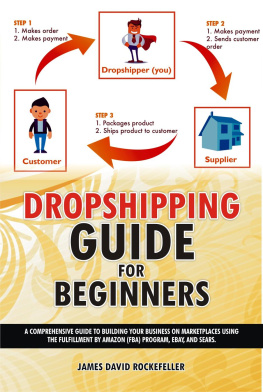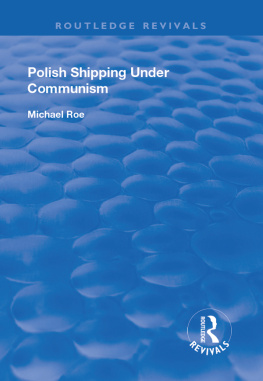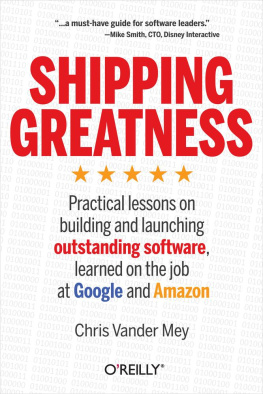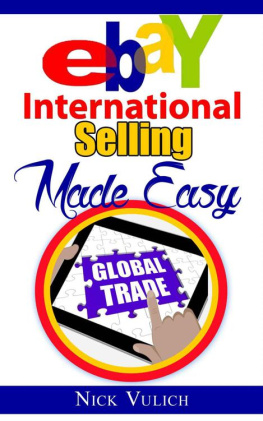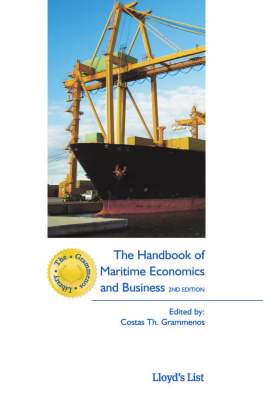Shipping Business Unwrapped
The shipping business is a lesser-known industry, but it is an extremely influentialelement in the global economy. This book provides a snapshot of theshipping business with micro-foundations from the perspectives of institutionaland behavioural economics while uncovering hidden facts about the industry.
Rather than spending a great deal of time reading many books or consultingcostly advisors about fundamental issues, readers can quickly and easilyfind core concepts examined from multiple perspectives. They will certainlyenjoy the engaging, narrative-driven content and learn many surprising truthsabout this fascinating business.
Okan Duru is Assistant Professor of Maritime Studies at Nanyang TechnologicalUniversity, Singapore. His major research interests are maritime economics,computational intelligence for shipping economics, economic pluralism, maritimepolicies, shipping investment and finance. He received his PhD, on theLong-term Econometric Analysis of Dry Bulk Shipping, at the Graduate Schoolof Maritime Sciences, Kobe University. He has published in various journals andconferences proceedings, in addition to reviewing and editing papers.
Routledge Maritime Masters
1. Port Economics
Wayne K. Talley
2. Port Economics
Second edition
Wayne K. Talley
3. Management of Shipping Companies
Ioannis Theotokas
4. Managing Human Resources in the Shipping Industry
Edited by Jiangang Fei
5. Shipping Business Unwrapped
Illusion, Bias and Fallacy in the Shipping Business
Okan Duru
For more information about this series, please visit www.routledge.com/Routledge-Maritime-Masters/book-series/RMM
Shipping Business Unwrapped
Illusion, Bias and Fallacy in the Shipping Business
Okan Duru

First published 2019
by Routledge
2 Park Square, Milton Park, Abingdon, Oxon OX14 4RN
and by Routledge
711 Third Avenue, New York, NY 10017
Routledge is an imprint of the Taylor & Francis Group, an informa business
2019 Okan Duru
The right of Okan Duru to be identified as author of this work has been asserted by him in accordance with sections 77 and 78 of the Copyright,Designs and Patents Act 1988.
All rights reserved. No part of this book may be reprinted or reproduced or utilised in any form or by any electronic, mechanical, or other means, now known or hereafter invented, including photocopying and recording, or in any information storage or retrieval system, without permission in writing from the publishers.
Trademark notice: Product or corporate names may be trademarks or registered trademarks, and are used only for identification and explanation without intent to infringe.
British Library Cataloguing-in-Publication Data
A catalogue record for this book is available from the British Library
Library of Congress Cataloging-in-Publication Data
Names: Duru, Okan, author.
Title: Shipping business unwrapped : illusion, bias and fallacy in the shipping business / by Okan Duru.
Description: Abingdon, Oxon ; New York, NY : Routledge, 2019. | Series: Routledge maritime masters ; 5 | Includes bibliographical references and index.
Identifiers: LCCN 2018025589| ISBN 9781138292451 (hardback) | ISBN 9781138292468 (pbk.) | ISBN 9781315231341 (ebook)
Subjects: LCSH: Shipping.
Classification: LCC HE571 .D87 2019 | DDC 388/.044--dc23
LC record available at https://lccn.loc.gov/2018025589
ISBN: 978-1-138-29245-1 (hbk)
ISBN: 978-1-138-29246-8 (pbk)
ISBN: 978-1-315-23134-1 (ebk)
To Haluk, Kerem, and Kazue for their patience
Figures
Table
This state of things was brought about by the large OVER-PRODUCTION OF TONNAGE during the three previous years, fostered by RECKLESS CREDIT given by the BANKS and BUILDERS and over-speculation by the irresponsible and INEXPERIENCED SHIPOWNERS.
E.A.V. Angier, The Times, London, January 7, 1885
Most people take the shipping industry for granted. While consumers may know that many of their products come from overseas, they rarely stop to consider just how their purchases travel from a foreign country to the stores shelf. If they do think about oceangoing vessels, they often romanticize about the stories they know of shipowners and captains.
The reality is that modern shipping is an industrial operation comprising a complex web of logistics, thousands upon thousands of transactions, multimillion-dollar deals, and billions of dollars worth of cargo. The finance functions supporting the maritime industry have also matured, with ships bought and sold as portfolio investments much like stock options, managed by corporate executives in suits, and subject to speculation with sophisticated financial instruments. Most importantly, the development of the maritime transportation and shipping business is one of the essential drivers of the globalization phenomenon.
Despite these advancements, the industry is still a long way from completely maturing. Due to the unique nature of shipping, the romantic sentiment attached to ships, the complexity of maritime law, unceasing shipboard operations, the frequent inaccessibility of the crews and vessels, and the long-standing traditions of the sea, the business has not experienced the same commercial and academic scrutiny as, say, the banking or manufacturing sectors. Many of the key elements that drive the industry are still little understood by practitioners, investors, and shipowners. Also, because professional management is a somewhat recent development, too many managers have too few resources to help them prepare for the challenges of managing a vessel, much less a fleet.
The classical view of economics assumed that people in a given profession are rational actors. Despite the challenges and critiques of other scholars, mainstream economists still maintain this view. They argue that while there may be some irrational decision-makers, such outliers will not determine the outcome of the whole and that the cumulative decisions of the marketplace will result in a rational outcome. Such people are assumed to be profit-maximizing agents who collect all available information, analyze it rationally, and make a decision unencumbered by emotions or other such limitations. In terms of the shipping industry, conventional economic publications usually focus on the supply-and-demand framework, the dynamics of the market, and models based on the theory of the rational actor.
Allow me to pose a simple but revealing question to challenge the bedrock of neoclassical economics: if people are genuinely rational actors as a collective whole, why does marketing exist? Moreover, why has it flourished? Why do inferior products sell well and their manufacturers thrive while the parent companies of superior products go bankrupt? Why do corporations spend millions upon millions of dollars on marketing campaigns and reap billions in return? In other words, why do TV commercials, social media branding and many other marketing tricks work?
Marketing is effective because it changes peoples perceptions. It influences their spending habits in irrational ways. Were this true only of average consumers, we might not have experienced the national and even international market breakdowns that we have in the past. However, even the most educated and experienced people on the planetthose who should know bettersuccumb to their irrational natures. They, too, are vulnerable to making decisions based more on their emotions and perceptions than on cold, hard facts and concrete data. Edward Bernays (1955), known as the father of propaganda, demonstrated practically how marketing would change minds of crowds with his famous marketing campaign to promote female smoking using feminist symbols.

